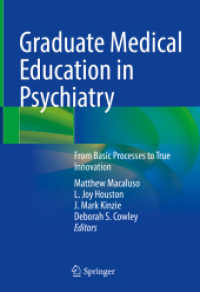Full Description
The differences among functionalist, cognitivist and/or constructionist models are generally taken to be not absolute, but rather a matter of emphasis and degree, with an increasing permeability between paradigms arising from cross-fertilizing influences. This book further explores this burgeoning area of research through the notion of functional-cognitive space, namely, the topography of the space occupied by functional, cognitivist and/or constructionist models against the background of formalist approaches in general and of Chomsky's Minimalism in particular. Specifically, the twelve contributions in the present volume update the reader on recent developments in functionalism (Systemic Functional Grammar, Functional Discourse Grammar and Role and Reference Grammar) and cognitivism (Word Grammar, (Cognitive) Construction Grammar and the Lexical Contructional Model). Plotting cognitive-space proves particularly adequate for situating the six models represented in this volume, not only in relation to each other, but also potentially with respect to a wide spectrum of functionalist, cognitivist and/or constructionist models.
Contents
1. Introduction. Plotting functional-cognitive space (by Gomez Gonzalez, Maria de los Angeles); 2. Part I. Systemic Functional Linguistics; 3. Giving it my best shot: Towards a coherent functional analysis of metaphorically-derived processes with particular attention to the 'light verb' expressions (by Tucker, Gordon H.); 4. The cultural classification of 'things': A system network for English noun senses (by Fawcett, Robin P.); 5. An interpersonal study of The Leading Hotels of the World. A systemic-functional social-semiotic approach (by Moya Guijarro, A. Jesus); 6. Theme and variations (by Berry, Margaret); 7. Part II. Functional Discourse Grammar; 8. Modification as a propositional act (by Rijkhoff, Jan); 9. Derivational morphology in Functional Discourse Grammar (by Garcia Velasco, Daniel); 10. "Agreement" as a perspectivizing device in discourse: The view from French (by Cornish, Francis); 11. Part III. Role and Reference Grammar; 12. Interfacing the lexicon and an ontology in a linking system (by Van Valin Jr., Robert D.); 13. From directionals to telics: Meaning construction, word-formation and grammaticalisation in Role and Reference Grammar (by Martin Arista, Javier); 14. Part IV. Cognitively-oriented and construction-based approaches; 15. Cognitive functionalism in language education (by Hudson, Richard A.); 16. "That's so a construction!": Some reflections on innovative uses of "so" in Present-day English (by Gonzalvez-Garcia, Francisco); 17. Constructing discourse and discourse constructions (by Ruiz de Mendoza Ibanez, Francisco Jose); 18. Name index; 19. Term index






